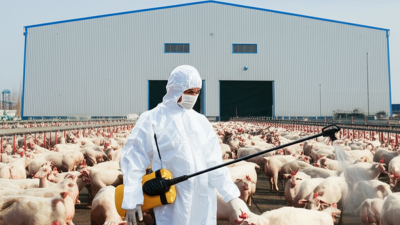In the agricultural industry, the importance of farm disinfection has never been more critical, especially in light of rising concerns over biosecurity and animal health. According to a recent report by the Food and Agriculture Organization (FAO), effective disinfection protocols can reduce the incidence of infectious diseases in livestock by up to 50%, significantly enhancing productivity and animal welfare. As China emerges as a leading manufacturer of disinfection solutions, its innovative technologies and stringent quality controls set a benchmark for excellence. This blog explores unmatched quality in farm disinfection from China's leading factory, highlighting the latest advancements and practical tips to implement effective disinfection strategies on farms. Understanding these innovations is vital for farmers aiming to protect their livestock and optimize their operations in an increasingly competitive market.

Farm disinfection plays a crucial role in ensuring the health and productivity of livestock and crops. The importance of maintaining a clean and sterile environment cannot be overstated, as pathogens and harmful microorganisms can quickly spread in agricultural settings. Effective disinfection not only prevents disease outbreaks but also enhances the overall quality of produce, ensuring that farms can meet market demands and maintain consumer trust.
Investing in high-quality disinfection solutions provides numerous benefits that extend beyond just health. An effective disinfection program reduces the need for antibiotics, fosters animal welfare, and ultimately leads to increased profitability for farmers. Furthermore, with advancements in technology, modern disinfection methods are more efficient and safer, minimizing chemical residues in food products. As China's leading factory in this sector, we are committed to providing unmatched quality disinfection solutions that enhance farm sustainability and operational success.
In the world of agriculture, maintaining hygiene and preventing disease outbreaks are paramount. The key ingredients in effective disinfectants play a crucial role in safeguarding livestock and crops. Powerful antimicrobial agents such as hydrogen peroxide, quaternary ammonium compounds, and sodium hypochlorite are commonly utilized for their efficacy in eliminating pathogens. These ingredients not only provide a robust defense against bacteria, viruses, and fungi but also ensure a safe environment for both animals and plants.
Moreover, it is essential for farmers to choose disinfectants that are not only effective but also environmentally sustainable. Leading factories in China prioritize the development of bio-based disinfectants, utilizing natural extracts and biodegradable components that reduce chemical residue and minimize ecological impact. By integrating safe and effective ingredients, these disinfectants enhance farming practices while promoting the health of the environment. Farmers can now confidently implement these advanced solutions to create a hygienic farming ecosystem that promotes productivity and sustainability.
In recent years, China's manufacturing sector has undergone a significant transformation characterized by quality and innovation. A growing number of manufacturers are adopting intelligent production techniques, which optimize efficiency and enhance product quality. According to the National Bureau of Statistics, the manufacturing Purchasing Managers' Index (PMI) has shown resilience, reflecting a steady recovery in production activities. This aligns with the government's push for integration of digital technologies within the manufacturing landscape, often referred to as "smart manufacturing."
Leading Chinese manufacturers are not just keeping pace but are also setting benchmarks globally. The emergence of high-quality production services is a catalyst for the "New Quality Productivity." This concept, highlighted by industry experts, underscores how modern production environments leverage real-time data to streamline operations and maintain high standards. As highlighted in recent analyses, sectors that embrace these advancements, including automation and data-driven manufacturing practices, are witnessing superior growth and efficiency, further contributing to China's position as a manufacturing powerhouse on the world stage. With continuous investments in innovation, China's manufacturing industry is poised to redefine quality standards for farm disinfection and beyond.
In the field of farm disinfection, the comparative analysis between local and international solutions reveals significant insights into the efficacy and accessibility of these products. Local disinfection solutions often stem from innovations that cater specifically to resource-constrained communities. For instance, the development of low-cost systems capable of producing concentrated hypochlorous acid exemplifies how local manufacturing can meet essential sanitation needs effectively, eliminating reliance on premium-priced imported alternatives.
On the other hand, international disinfection products may offer advanced technological features and broader recognition in the market. However, the true test of their efficiency and sustainability often hinges on their adaptability to local contexts. A critical examination of these alternatives suggests that while international solutions may provide a certain level of efficacy, they must also align with local economic conditions and environmental considerations. By prioritizing locally produced solutions, we can foster not only improved sanitation practices but also enhance economic stability and social resilience within agricultural communities.
| Disinfection Method | Effectiveness (%) | Application Area | Cost per Liter (USD) | Environmental Impact |
|---|---|---|---|---|
| Chlorine Dioxide | 98 | Livestock, Equipment | 0.80 | Low |
| Quaternary Ammonium Compounds | 90 | Surfaces, Tools | 1.20 | Moderate |
| Hydrogen Peroxide | 95 | Livestock, Water Treatment | 1.50 | Low |
| bleach solution | 85 | Equipment, Floors | 0.50 | High |
| Iodophor | 88 | Teats, Skin | 1.00 | Moderate |
Implementing effective farm disinfection protocols is essential for maintaining biosecurity and preventing the spread of diseases in agricultural environments. According to a report on the North America Agricultural Disinfectants Market, the sector is projected to reach USD 1.13 billion by 2033, with the United States capturing a significant share of 64.2% by 2024. This growth emphasizes the increasing recognition of disinfection practices as a cornerstone of farm management.
One of the best practices in implementing these protocols involves conducting thorough evaluations of cleaning and disinfection routines. A study using boot swabs to assess the success of decontamination in poultry barns highlights the need for accurate monitoring. Additionally, proactive measures, such as establishing access management plans and quarantine protocols, are vital for infection control on farms. The successful integration of these strategies not only helps in improving overall hygiene but also reduces the risk of disease outbreaks, thereby contributing to more sustainable agricultural practices.
